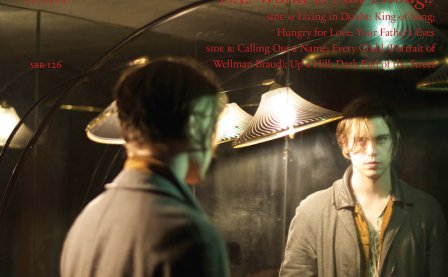According to Iceage frontman Elias Bender Rønnenfelt, his vocals are higher in the mix on Plowing Into the Field of Love because, among other things, he’s “just better at English now.” Immediately, it makes sense that Iceage sound how they do. Creating poetic art in one’s second language can be an act of further self-displacement, as one reaches out blindly toward the periphery of symbolism, searching for the excess of meaning in an already unfamiliar field of knowledge. Punk lends itself well to that expressive gap, because no one cares about what your words mean when you scream them into the void. It may be correct to call Plowing Into the Field of Love Iceage’s most hushed and verbose statement to date, yet it seems that, with a larger vocabulary, Rønnenfelt’s world has itself become larger, more inexplicable, and more alienating. In that sense, a new anger courses through these odd and often shimmeringly affective songs.
The bigger part of the record grapples with identity. The lyrics make liberal use of adjectives while dancing around objects themselves or presenting those objects as explicitly unreal, as is the case with “Glassy Eyed, Drunken and Veiled,” in which the title describes an “absent father.” On “Forever,” Rønnenfelt feels “split in two,” and longs to “fall into the other/ Like it was an ocean.” The main existential friction in this music concerns the paradoxical desire to return the defective self to the factory of the world of sense experience. Sometimes, it feels like Rønnenfelt is failing to arrive at an understanding of himself and meditating wistfully on a universe for which he is unfit. First single “The Lord’s Favorite” can be read as a bizarre and ironic expression of marginality, taking perverse pride in feeling completely alone. Self-destruction is a recurring theme, expressed most memorably in the opening croon of erratic ballad “Against the Moon,” which appeals: “Oh my pistol, shining bright/ Justify me, make me right.”
Still, as Rønnenfelt embraces nothingness, he lashes out in equal measure against the very world of experience against which he initially seeks justification. Both the title track (complete with a Britpop chorus) and “Stay” contain imagery of violence against nature, as love is likened to an undomesticated field and Rønnenfelt describes his drunken and unwilling destruction of a “merciful, derelict” natural landscape. Generalized anxiety are present on “How Many” and “Abundant Living,” between innumerable “days of disorder” and the emancipatory moment of a molotov cocktail’s impact. The latter track, which is the most sonically “punk,” refers equally to drinking and burning alcohol. In the universe of Plowing Into the Field of Love, drunkenness and the loss of physical capability represent a constant state of destructive power against a confusing universe. The causal link between alcoholism and Rønnenfelt’s “drunkenness” isn’t drawn as clearly as that between the latter and the world’s naturally ordered operation.
This is all to say very little of how this album sounds or to what it aspires. What does it mean to search for utopia? That’s a prickly question for any alleged fascist, but Iceage approach a more complicated answer. Dense thickets of sound, accented with starkly loud strings, horns, keys, and voices, accompany complete emotional self-evisceration and are meant to convey the bewildering world of the senses, within which the kinds of policing on which punk music and extreme politics both rely become deconstructed and abstract. At the energetic apex of “How Many,” the feeling of being “Trapped in a body/ That doesn’t act on thought” is connected to a peaceful sense of worldly perfection. If Plowing Into the Field of Love is meant to convey anything, it’s the otherworldly passion of a world without control and without truth.
More about: Iceage




